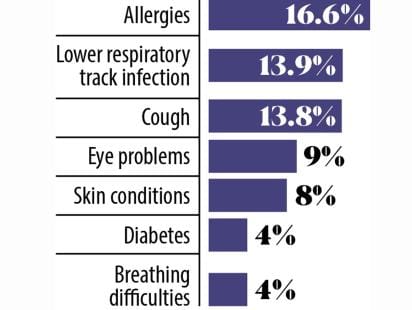Illnesses caused by air polution: The Invisible Killer


Air pollution is killing around 80,000 people every year in Bangladesh by causing respiratory problems as well as depression, and wiping out around 4 percent of the country's GDP, said a World Bank report yesterday.
The report titled "Breathing Heavy: New Evidence on Air Pollution and Heath in Bangladesh" assessed the impacts of outdoor air pollution on physical and mental health in Dhaka and Sylhet divisions.
Children under five years and elderly people with comorbidities such as diabetes, heart or respiratory conditions, are most vulnerable, it said.
"In 2019, air pollution was the second largest cause of deaths and disability in Bangladesh and cost about 3.9 to 4.4 percent of the country's GDP," said Dandan Chen, acting World Bank country director for Bangladesh and Bhutan, while launching the report at a Dhaka hotel.
While air pollution levels within the country vary significantly, the report found that the concentration of fine particulate matter PM2.5 in all regions is significantly above the threshold set by the WHO Air Quality Guidelines (AQG).
PM 2.5, which is basically dust and other matters generally smaller than 2.5 micrometres, is considered most hazardous to health. Being that small, the particles penetrate deep into the lungs and enter the bloodstream.
According to the report, Dhaka is the most polluted division while Sylhet is the least polluted. The western regions (Khulna and Rajshahi) are more polluted than the eastern ones (Sylhet and Chattogram).
Dhaka city ranked the second most polluted city in the world from 2018 to 2021. It has sites with major construction and persistent traffic and has the highest level of air pollution in the country.
At these sites, PM2.5 is on average 150 percent above the WHO AQG. Exposure to such high level of polluted air is equivalent to smoking about 1.7 cigarettes per day, the report said.
The second highest concentration of PM2.5 levels has been found near brick kilns in greater Dhaka, which is 136 percent above the WHO AQG, equivalent to smoking 1.6 cigarettes per day.
Incidence of lower respiratory tract infections was significantly higher among children living near major construction and traffic sites than elsewhere in the country, including near brick kilns.
In Dhaka division, in addition to local pollution sources, up to one-fifth of the total PM2.5 concentration comes from transboundary sources.
Sylhet division, which has the cleanest air, still experiences average PM2.5 levels 80 percent above WHO AQG. This is equivalent to smoking 1.2 cigarettes per day.
Saber Hossain Chowdhury, MP, chairman of the Parliamentary Standing Committee on the Ministry of Environment, Forest and Climate Change, who was present at the event as chief guest, said Bangladesh has many environmental laws but the lack of implementation of those is the problem.
Emphasising the usage of cleaner fuel, he said, "We need to import quality fuel to reduce the level of pollution."
He noted that the number of vehicles was increasing every year.
Md Anwar Hossain Howlader, secretary to Health and Family Welfare, said in government tenders, it is mentioned how to conduct the construction work reducing air pollution. But they do not follow it so that they can make more profits.
"We cannot stop the development work, but it is possible to reduce the pollution level if they follow the government directions and obey the law," he said.
Agreeing with Saber, he said the government officials who are responsible for monitoring, do not conduct their duties properly, making things worse.
According to the report, a one percent increase in exposure to PM2.5 over WHO's AQG can result in a 12.8 percent increase in the probability of a person experiencing breathing difficulties, a 12.5 percent increase in the probability of having wet coughs, and an 8.1 percent higher risk of contracting lower respiratory tract infections.
Air pollution also affects mental health. Depression is most reported in locations with major construction and persistent traffic. The study finds that a one percent increase in exposure to PM2.5 above the WHO AQG is associated with a 20 percent higher probability of being depressed.
"Air pollution causes the climate to change, and climate change worsens the air quality. Over time, climate change and urbanisation will further intensify air pollution," said Wameq Azfar Raza, a World Bank health specialist and the lead of the report.
"The health sector needs to be well prepared to deal with the imminent health crisis arising from air pollution and climate change" he added.
The report recommended immediate actions, including improving public health services and response mechanisms, improving air pollution data monitoring systems, investing in early warning systems, and engaging in further research to reduce air pollution impacts on health.



 For all latest news, follow The Daily Star's Google News channel.
For all latest news, follow The Daily Star's Google News channel.
Comments